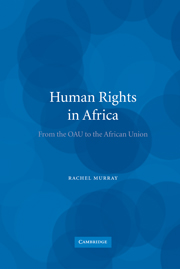Book contents
- Frontmatter
- Contents
- Acknowledgements
- List of abbreviations
- 1 Historical overview of human rights in the OAU/AU
- 2 The relationship between the OAU/AU and the African Commission on Human and Peoples' Rights
- 3 The link between human rights and democracy
- 4 The relationship between conflict and human rights
- 5 Women and the OAU/AU
- 6 Children's rights in the OAU/AU
- 7 Refugees and human rights
- 8 Development, NEPAD and human rights
- 9 Conclusion
- Appendix I Charter of the Organization of African Unity
- Appendix II Constitutive Act of the African Union
- Appendix III African Charter on Human and Peoples' Rights
- Bibliography
- Index
6 - Children's rights in the OAU/AU
Published online by Cambridge University Press: 27 July 2009
- Frontmatter
- Contents
- Acknowledgements
- List of abbreviations
- 1 Historical overview of human rights in the OAU/AU
- 2 The relationship between the OAU/AU and the African Commission on Human and Peoples' Rights
- 3 The link between human rights and democracy
- 4 The relationship between conflict and human rights
- 5 Women and the OAU/AU
- 6 Children's rights in the OAU/AU
- 7 Refugees and human rights
- 8 Development, NEPAD and human rights
- 9 Conclusion
- Appendix I Charter of the Organization of African Unity
- Appendix II Constitutive Act of the African Union
- Appendix III African Charter on Human and Peoples' Rights
- Bibliography
- Index
Summary
On paper, it seems that considerable attention has been paid to the position of children and protection of their rights by the OAU/AU, culminating in the adoption and eventually coming into force of its own African Charter on the Rights and Welfare of the Child (ACRWC). This Charter has been said to have been an attempt to instil some element of ‘African’ characteristics into the international standards created by the UN Convention on the Rights of the Child (UNCRC). However, whilst many OAU states ratified the UNCRC, an insufficient number of ratifications delayed the coming into force of the OAU Charter. Even when this had been achieved, the appointment of its Committee was delayed. This suggests that the commitment to such African values has not been accompanied by adequate enforcement. In addition, standards and values formulated outside the Charter framework by the OAU/AU organs do not appear to have been consolidated into a coherent plan for dealing with the rights of the child in Africa. Further, the overall approach of the OAU/AU has been criticised for focusing more on the situation of children and their position in the context of development, rather than their rights.
Although the OAU organs paid some attention to children, their rights remained neglected for many years as they were generally not seen to be within the scope of the African Commission on Human and Peoples' Rights in Banjul while it awaited the adoption of the additional Charter on the Child and the appointment of its Committee.
- Type
- Chapter
- Information
- Human Rights in AfricaFrom the OAU to the African Union, pp. 163 - 184Publisher: Cambridge University PressPrint publication year: 2004



